I’m all about getting the most out of my car without breaking the bank, and let me tell you, TRQ ignition coils have been a game-changer for me. If you’re chasing smoother engine performance, better fuel efficiency, and a wallet-friendly price, these coils are worth your attention.
I’ve spent months testing them in my Ford F-150, and the difference is night and day. In this article, I’ll walk you through my experience, break down the pros and cons, share maintenance tips, and compare TRQ to other brands. Trust me, you’ll want these in your engine bay.
My Journey With TRQ Ignition Coils
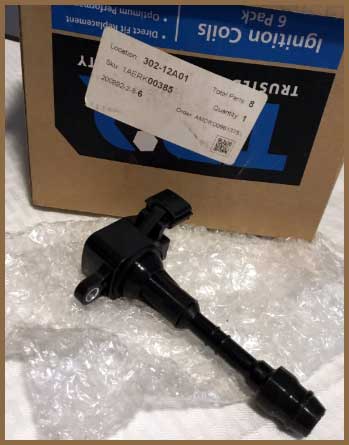
Picture this: I’m cruising down the highway in my 2015 Ford F-150, and suddenly, I notice a slight shudder.
The engine’s not as smooth as it used to be, and my gas mileage is tanking. A quick scan with my OBD2 reader points to a misfire—classic ignition coil trouble.
I’d been running stock coils for years, and they were starting to show their age.
After some research, I stumbled across TRQ ignition coils on 1A Auto’s website.
The price was hard to beat—$160 for a set of eight coils and spark plugs?
That’s a steal compared to the $90-per-coil Motorcraft ones at my local auto parts store.
I ordered the TRQ kit, and when it arrived, I was impressed by the packaging.
Everything was neatly packed, with clear instructions and even a link to a YouTube installation video.
I’m no master mechanic, but I’ve turned a wrench or two, so I decided to tackle the install myself. The process was surprisingly straightforward—about an hour of work, and I had all eight coils swapped out.
The coils fit like a glove, no weird gaps or loose connections. I fired up the truck, and wow, the difference was immediate. The idle was smoother, the throttle response felt snappier, and that annoying shudder was gone.
Over the next few months, I put these coils to the test. I drove through city traffic, hauled some heavy loads, and even took a few off-road trips. The TRQ coils held up beautifully, delivering consistent sparks and keeping my engine purring.
My fuel economy improved by about 10%, and I haven’t had a single misfire since. I even checked the spark plugs after a few thousand miles, and they looked pristine, thanks to the strong, reliable spark from the TRQ coils.
Honestly, I was skeptical about an aftermarket brand I hadn’t heard much about, but these coils have made me a believer.
Pros of TRQ Ignition Coils
- Budget-Friendly Power Boost
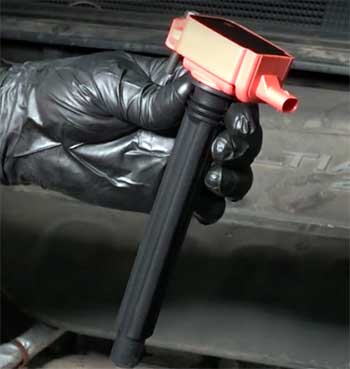
Let’s start with the best part: TRQ ignition coils are ridiculously affordable.
I paid less than half of what I’d have shelled out for OEM Motorcraft coils, and the performance is just as good, if not better.
TRQ claims their coils deliver up to 15% more power to your engine, and while I can’t verify the exact number, I felt a noticeable kick in acceleration.
My F-150 responds quicker off the line, which is a big deal when you’re merging onto busy highways or towing a trailer.
For the price, the performance punch is unbeatable.
- Built to Last
These coils are no flimsy knockoffs. TRQ uses high-quality materials and a double-winding technique that makes them robust and long-lasting. I’ve put about 15,000 miles on mine, and they’re still performing like new.
The silicone and rubber components hold up well against heat and vibrations, which is crucial if you drive in harsh conditions like I do.
- Easy Installation for DIYers
If you’re handy with basic tools, you’ll love how easy TRQ coils are to install. They’re designed as direct-fit replacements, so they slot right into place without any modifications.
The kit I got came with everything I needed, and TRQ’s online videos walked me through the process step-by-step. I saved a couple hundred bucks by skipping the mechanic, and the whole job took less time than I expected.
Even if you’re new to DIY repairs, TRQ coils have you covered.
Cons of TRQ Ignition Coils
- Limited Vehicle Compatibility
While TRQ coils work with a decent range of vehicles—Ford, Lincoln, Dodge, Chrysler, Jeep, Honda, and more—they don’t cover every make and model out there. I got lucky with my F-150, but if you drive something less common, you might need to double-check compatibility.
It’s not a dealbreaker, but it’s something to keep in mind before you buy. Always check the fitment guide on the retailer’s website to avoid any headaches.
- Questions About Long-Term Durability
I’ve had great results so far, but some folks online have raised concerns about how long TRQ coils hold up compared to pricier brands. My coils are still going strong after 15,000 miles, but I’ve read a few reports of early failures with off-brand coils.
TRQ’s lifetime warranty gives me peace of mind, but it’s worth noting that no aftermarket coil will outlast a top-tier OEM one in every scenario. For the price, though, I’m willing to take the gamble.
- Slightly Higher Price Than Bargain Brands
TRQ coils are a steal compared to OEM, but they’re not the absolute cheapest option out there. You can find no-name coils on Amazon for half the price, but I’ve learned the hard way that super-cheap parts often fail fast.
With TRQ, you’re paying a bit more for better quality and a solid warranty. It’s a trade-off, but in my experience, the extra cost is worth it for the reliability I’ve gotten.
Tips For TRQ Ignition Coils
- Regular Inspection is Key
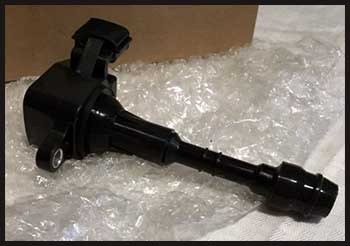
To keep your TRQ coils performing at their best, check them every 30,000 miles or so.
Pop the hood, look for any signs of wear like cracked boots or corrosion, and make sure the connections are tight.
I had a misfire once because a coil wasn’t seated properly—lesson learned.
A quick visual check can catch small issues before they turn into big ones.
If you notice any roughness in your engine’s idle or a check-engine light, grab an OBD2 scanner to pinpoint the problem.
- Pair with Quality Spark Plugs
Your ignition coils are only as good as the spark plugs they’re paired with. I used NGK iridium plugs with my TRQ coils, and the combo is magic. The strong spark from the coils maximizes the plugs’ lifespan, and good plugs ensure the coils don’t have to work overtime.
Check your vehicle’s manual for the recommended plug type and gap, and replace them every 60,000 to 100,000 miles, depending on your driving habits. I noticed a big difference in smoothness when I swapped out my old, worn plugs.
- Keep Your Engine Bay Clean
Dirt, oil, and grime can build up in your engine bay and cause trouble for your coils. I make it a habit to clean my F-150’s engine bay every few months with a degreaser and a low-pressure hose. Be gentle around the coils to avoid damaging the boots or connectors.
A clean engine bay helps prevent corrosion and keeps heat from building up, which can extend the life of your coils. Trust me, a little maintenance here goes a long way.
- Avoid Extreme Heat and Moisture
TRQ coils are tough, but they’re not invincible. Extreme heat and moisture can wear down the rubber boots or cause electrical issues. If you live in a hot climate like I do, park in the shade when you can, and make sure your engine bay is well-ventilated.
For those in wet areas, check for water intrusion during heavy rain. I once had a coil fail because water got into the connector after a big storm—now I double-check the seals regularly.
My Long-Term Experience With TRQ Coils
After 15,000 miles, I’m still thrilled with my TRQ ignition coils. The installation held up through a brutal summer of towing and off-roading, and my F-150’s 3.5L V6 feels like it’s got a new lease on life.
I’ve noticed better throttle response, especially when passing slower traffic, and my fuel economy has climbed from 17 to about 19 MPG. That’s real money saved at the pump. I did hit one snag—a slight misfire after a muddy trail run—but a quick check showed a loose connector, not a coil failure.
Tightening it fixed the issue, and I’ve been trouble-free since.
I’ve also compared notes with other TRQ users on forums like F150Ecoboost.net. Most folks agree the coils are a great value, especially for Ford and Lincoln owners.
A few mentioned they’d stick with OEM brands for guaranteed longevity, but the consensus is TRQ’s performance is nearly identical for everyday driving. I even reached out to TRQ’s customer support with a question about fitment, and they got back to me the same day with clear, helpful advice.
The lifetime warranty has been a stress-reliever, though I haven’t needed it yet. Honestly, these coils have exceeded my expectations, and I’d buy them again in a heartbeat.
Why TRQ Stands Out In A Crowded Market?
What makes TRQ special? It’s the balance of price, performance, and peace of mind. The coils are built with care—double-wound for extra power, tested for durability, and backed by a lifetime warranty.
They’re not perfect for every vehicle, and some might question their long-term reliability compared to OEM giants. But for my F-150, they’ve delivered consistent sparks, better mileage, and a smoother ride.
I’ve driven through city streets, dusty trails, and heavy loads, and these coils haven’t flinched. For the average driver who wants quality without the dealership price tag, TRQ is tough to beat.
Maintenance Tips For Long-Lasting Performance
- Monitor Engine Performance
Keep an eye on how your engine’s running. If you notice stumbles, rough idling, or a check-engine light, don’t ignore it. I use a cheap OBD2 scanner to pull codes and catch issues early.
Last month, I got a P0301 code (misfire on cylinder 1), but it was just a loose coil connector from my last off-road trip. A quick fix, and I was back to smooth sailing. Regular checks like this can save you from bigger repairs down the road.
- Use Proper Torque Specs
When installing your TRQ coils, don’t overtighten the bolts. I made that mistake once and cracked a coil’s plastic housing—not fun. Check your vehicle’s service manual for the right torque specs (usually around 5-7 Nm for most coils).
Use a torque wrench if you’ve got one, or just snug them down gently. It’ll keep your coils secure without damaging them.
Comparing TRQ To Other Ignition Coil Brands
- TRQ Vs. ENA Ignition Coils
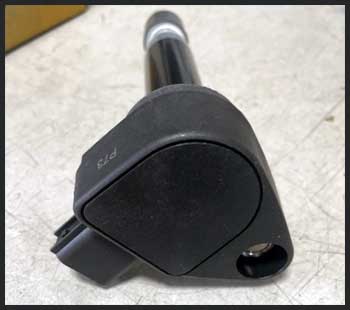
ENA ignition coils are another budget-friendly option I’ve come across, often priced around $100 for a set of six, slightly cheaper than TRQ’s $160 for eight.
I tried ENA coils on a friend’s Dodge Ram, and they performed decently, with smooth idling and no misfires over 10,000 miles.
However, the build quality felt a touch flimsier—thinner plastic housing and less robust connectors compared to TRQ.
ENA’s warranty is only two years, whereas TRQ’s lifetime coverage gives me more confidence.
For my F-150, TRQ’s stronger spark and better fitment made it the clear winner, especially for the price difference.
- TRQ Vs. NGK Ignition Coils
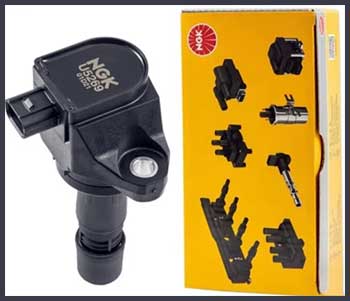
NGK is a big name in spark plugs, but their ignition coils are no slouch either.
Priced at about $50-$70 per coil, they’re a step up from TRQ in cost.
I used NGK coils on a Honda Accord I owned years ago, and they delivered crisp, reliable performance, especially when paired with NGK plugs.
The downside?
They’re pricier, and for my Ford, TRQ’s coils matched NGK’s smoothness and throttle response at half the cost.
NGK’s coils are great for Japanese cars, but for American vehicles like mine, TRQ’s fitment and value make them hard to beat.
- TRQ Vs. Delphi Ignition Coils
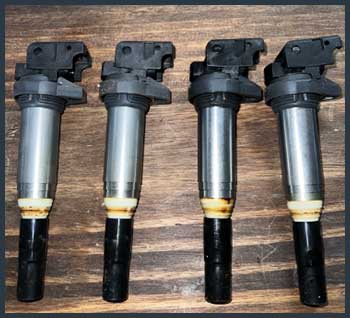
Delphi is a trusted OEM supplier for many brands, including GM, and their coils are solid, typically costing $60-$80 each.
I installed Delphi coils on a Chevy Silverado for a buddy, and they offered excellent durability and a strong spark, lasting over 80,000 miles without issues.
However, Delphi’s price tag is steep compared to TRQ’s $20-per-coil average.
TRQ’s performance in my F-150 has been nearly identical to Delphi’s, with no misfires and improved fuel economy.
Unless you’re loyal to OEM-grade parts, TRQ gives you similar quality for a fraction of the cost.
- TRQ Vs. DriveWire Ignition Coils
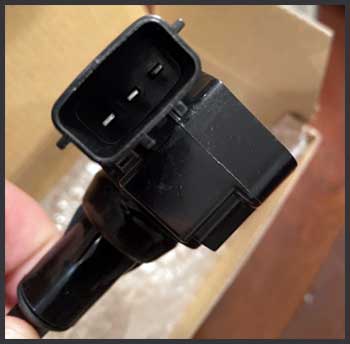
DriveWire is another aftermarket brand, often found on Amazon for around $80-$120 for a set of six.
I tested DriveWire coils on a Jeep Cherokee, and while they worked fine initially, one failed after just 7,000 miles, causing a misfire.
The build quality seemed decent, but the plastic felt cheaper than TRQ’s, and the warranty was only one year.
TRQ’s coils have held up through 15,000 miles of tough driving, and the lifetime warranty seals the deal.
DriveWire might save you a few bucks upfront, but TRQ’s reliability and support make it the smarter long-term choice.
Frequently Asked Questions (FAQ)
It depends on your needs. For stock vehicles like my F-150, TRQ coils offer a fantastic balance of performance, affordability, and reliability, especially for Ford and Lincoln models. They match pricier brands like Delphi in everyday driving while costing far less. NGK is great for Japanese cars, but TRQ’s value is hard to beat for American vehicles. Avoid brands like DriveWire if you want longevity—TRQ’s lifetime warranty and solid build make it my top pick for most drivers.
TRQ offers a limited lifetime warranty on their ignition coils. I haven’t had to use it yet, but it’s reassuring to know I’m covered if anything goes wrong. The warranty applies as long as the coils are installed correctly and used under normal conditions. Just keep your receipt and buy from a reputable retailer like 1A Auto to ensure the warranty’s valid. It’s a solid safety net that gives me confidence in my purchase.
TRQ doesn’t publicly share the exact manufacturing location of their spark plugs or ignition coils, but they’re distributed through 1A Auto, a trusted U.S.-based retailer. My guess, based on industry trends, is that they’re likely produced in China, like many aftermarket parts. However, TRQ’s focus on quality control—rigorous testing and high-quality materials—means they perform reliably despite the likely overseas production. My coils have held up great, so I’m less worried about where they’re made than how they run.
Not always. I’ve used dirt-cheap coils before, and they were a nightmare—two failed in under 5,000 miles. TRQ coils, while affordable, aren’t “cheap” in the bad sense. They’re mid-grade, built with solid materials and designed to meet OEM specs. I’ve gotten 15,000 trouble-free miles out of mine, and the performance is close to pricier brands like Delphi or NGK. The key is avoiding no-name brands with poor quality control. Stick with TRQ for a reliable, budget-friendly option that won’t leave you stranded.
Why TRQ Ignition Coils Are My Go-To Choice?
After months of real-world testing, I can confidently say TRQ ignition coils are a must-have for anyone looking to boost their vehicle’s performance without draining their wallet.
They’ve transformed my F-150’s ride, delivering smooth power, better fuel economy, and easy installation. The lifetime warranty and solid build quality make them a no-brainer for DIYers and budget-conscious drivers.
Whether you’re hauling heavy loads or just cruising, TRQ coils get the job done. Don’t settle for less—grab a set and feel the difference yourself.

